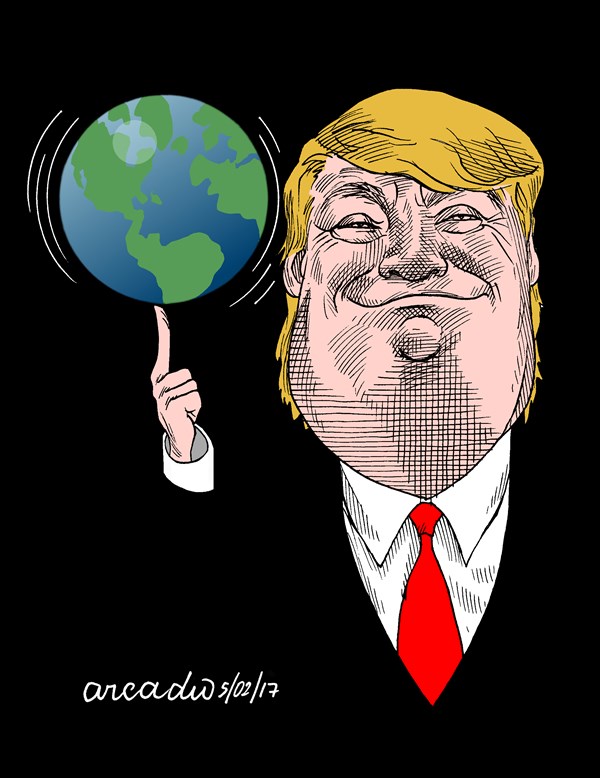
There was a tense moment during the 2016 Republican primary debates when former Florida Gov. Jeb Bush challenged Donald Trump for saying he would be "honored" to meet with North Korean dictator Kim Jong Un for disarmament talks.
"I can't tell you how big a mistake I think that is, to have bilateral talks with North Korea. It's precisely what Kim . . . wants," Bush lectured. "It will mean that China no longer is involved in convincing, along with us, for Kim. . . to get rid of his weapons. It's a big mistake to do that."
Trump was scornful in rebuttal, seeming to confuse Jeb Bush with his brother, the former president: "Just because he says it can't be done, that you'd lose China, doesn't mean it can't be done. I mean, this is the man who said 'There were weapons of mass destruction,' 'mission accomplished,' said we could fight the war on the cheap - none of which were true. We could have bilateral talks with Kim . . . And we can get those weapons at the same time as we get China."
Don't remember this? All right, I admit: There was no such exchange in 2016. What you have just read is a slightly adjustedtranscript of the Sept. 30, 2004, presidential debate, except I substituted Jeb Bush for then-President George W. Bush, and Trump for Democratic nominee John F. Kerry. (The Kim in these quotations is Kim Jong Il, father of the current dictator.)
It is instructive, though, to recall how much Trump's emerging approach to North Korea has in common with the most dovish proposals that have been floated over the years.
In 2004, Kerry said, "I want bilateral talks which put all of the issues, from the armistice of 1952, the economic issues, the human rights issues, the artillery disposal issues, the DMZ issues and the nuclear issues on the table."
That is a pretty fair description of what Trump seems to be up to in 2018, except he's also hinting about a massive package of South Korean and U.S. economic support for a non-nuclear North Korea, including, Secretary of State Mike Pompeo suggested on "Fox News Sunday," aid to "build the energy grid" and even to "eat meat and have healthy lives."
Kerry's views on such matters owed much to the strain of Cold War policy thinking that favored detente and arms control with the Soviet Union, on the assumption that Moscow was hostile to the United States but fundamentally rational, and, most important, unlikely ever to change. Many members of the foreign policy establishment, Republicans and Democrats, thought the best way to deal with Moscow and its allies was, well, to deal with them.
Reaganites, by contrast, felt that arms-control agreements were no substitute for the radical internal political change that alone could render the Soviets less dangerous, and for which the United States should strive, in part by calling attention to Moscow's human rights violations.
By playing down Kim Jong Un's human rights abuses while eschewing regime change and offering the Pyongyang regime a "security guarantee," Trump implicitly embraced an updated detente-ist worldview.
Or did he? In Iran, by contrast, Trump has overturned Kerry's handiwork, the nuclear deal, despite the fact that its intellectual assumptions were eerily similar to those of Trump's incipient approach to North Korea: tough economic sanctions got the adversary's attention, now it's time to cut a deal, and, finally, put old enmities aside.
In the Iranian case, Trump is pure Reaganite. He emphasizes that the regime's internal character has not changed, and that it's using an arms-control process to buy space and time for other forms of mischief, such as terrorism, until it inevitably reneges on nukes, too.
How reminiscent of President Ronald Reagan's argument that the Soviets had used negotiations with the Nixon, Ford and Carter administrations as a cover for adventurism in Africa and Latin America, and cheated on the treaties, to boot.
In contemporary conservative ideology, President Barack Obama's Iran deal plays the same role - bogeyman - that President Jimmy Carter's SALT II nuclear-arms treaty with the Soviets did in conservative ideology of the 1970s. The difference is that today Trump is scrapping the Iran deal whereas Reagan, as president, quietly continued to abide by SALT II, even without Senate ratification.
Reagan did make grand arms- control offers to the Soviets, but not until Mikhail Gorbachev's glasnost and perestroika policies suggested to him that the regime had fundamentally changed.
Leave it to Donald Trump to adopt the foreign policy theories of both Ronald Reagan and John Kerry, at the same time, in their most extreme formulations, and almost certainly unwittingly.
Now the whole world has reason to ponder F. Scott Fitzgerald's famous essay, "The Crack-up," and its famous dictum: "The test of a first-rate intelligence is the ability to hold two opposed ideas in mind at the same time and still retain the ability to function."


 Contact The Editor
Contact The Editor
 Articles By This Author
Articles By This Author